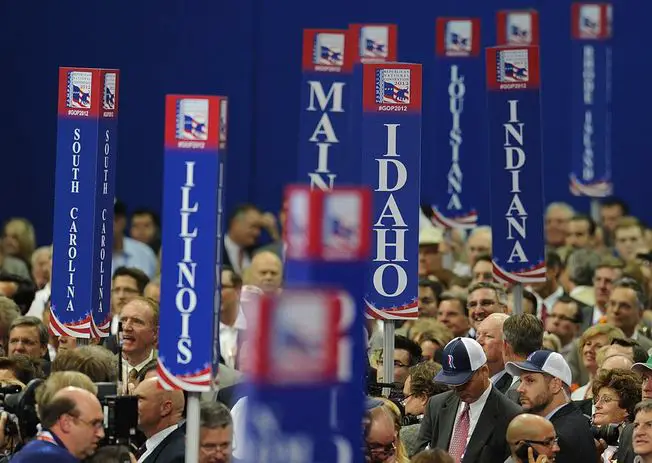There is still a race on the Republican side, even though the delegate math favors Donald Trump. Ted Cruz is working multiple angles both at the ballot box and behind the scenes in the world of pledged delegates. The goal of this plan is to work within the GOP delegate system with the hopes of prevailing in the second round of a contested Republican convention.
One thing could turn everything upside down. The Wall Street Journal reports that Cruz has been “poaching” delegates, with this example in Georgia:
Sen. Ted Cruz’s campaign has been operating an under-the-radar effort to prepare for a contested Republican convention this summer, and those moves appear to be bearing fruit in places such as this Atlanta exurb.
Though front-runner Donald Trump carried Georgia’s Coweta County by 12 percentage points three weeks ago, it was Cruz supporters who dominated an early stage of the arcane process of choosing the people who will serve as delegates at the Republican National Convention.
The goal: If Mr. Trump doesn’t win on the first ballot—freeing most delegates from voting for the candidate who won their state’s primary or caucus—Cruz supporters would dominate the convention, paving the way for the Texas senator to win the nomination on a later vote. [Emphasis added]
The article goes on to say that if Trump gets enough bound delegates to win on the first nomination, he’ll win. However, if he doesn’t win on the first ballot, anything could happen. On the second ballot, many delegates can vote for a different candidate from the one who “won” the state. Florida’s delegates can defect on the third ballot. The rules vary by state.
Therefore, if a candidate sneaks his supporters into a delegation which should vote for someone else, the second and third ballots could change dramatically from the first. And Georgia is an example of how this is already under way:
Even before Mr. Trump romped to victory in Georgia’s March 1 primary, Cruz supporters dominated the first stages of the complex process for selecting the state’s delegation to the national convention. The Texas senator’s supporters made up the preponderance of would-be delegates who on Feb. 20 attended precinct and county meetings to enroll at county conventions.
In straw polls that day conducted by the Georgia Association of Republican County Chairmen, 63% of attendees backed Mr. Cruz, compared with 13% who were Trump supporters.
So while the voters gave Georgia to Trump at 38.8% to Cruz’ 23.6%, the Georgia delegates plan to vote for Cruz 63% to 13% for Trump if no candidate reaches 1,237 delegates on the first ballot.
If Cruz succeeds in pulling off this coup, should there be riots, as Trump has warned?
The irony is that Cruz also says there will be a “revolt” if the top finisher does not get the nomination.
Cruz himself said this week that the party is risking a “manifest revolt” at the convention if someone besides the top finisher in delegates receives the nomination, but it’s clear in context that he’s thinking of a scenario where an establishment hero like Romney or Rubio is tapped while populist candidates are passed over. His point is simply that party leaders shouldn’t rig the outcome to favor one of their own. Unless I missed it, he’s never suggested it would be inappropriate per se to deny the candidate who finishes with the most delegates.
Why would Cruz support the top vote-getter if it’s not him?
Because Cruz is afraid of what McKay Coppins calls a “brokered” convention. Coppins is the author of a book called, “The Wilderness: Deep Inside the Republican Party’s Combative, Contentious, Chaotic Quest to Take Back the White House.”
Coppins defines a “contested” convention, as one in which the top vote getters battle it out to see which one wins. But in a “brokered” convention, if no one gets the nomination, influential party leaders may convince delegates to vote for someone else, such as Paul Ryan, who came in with no delegates at all. This has happened before, when a convention is deadlocked between two candidates, and delegates refuse to change sides. In one case, there were 103 ballots before the final vote picked a nominee.
But is Cruz being honest by saying the top vote-getter should get the nomination? Well, first of all, Cruz thinks he could be that top vote-getter. He has a way of “winning” caucus states, for example, and some say he won Iowa by “stealing” votes from Ben Carson.
What if Trump goes into the convention with more than enough to win on the first ballot? There’s nothing Cruz can do. He figures he might as well sound magnanimous.
BUT—if Trump walks in short of a first-ballot win, Cruz’ work to get his people packed into Trump’s delegations (like a Trojan Horse) will give Cruz the nomination after the first ballot.
How will Cruz justify this? Hasn’t he proclaimed that there will be a revolt if the TOP vote-getter doesn’t get the nomination? Simple. He’ll say it wasn’t up to him. “The delegates have spoken.”
The more you know about how American politics really works, the more you want to move to Canada.
ADDENDUM
US News has a new story on the topic that is worth a read. It explains how Cruz’ Washington knowledge of how to manipulate the political system, helps him use what it calls the “insider game” to defeat the popular vote from the primaries.
Further, the Daily Caller explains how the Cruz campaign is using party rules in Louisiana to come away with more delegates than Trump despite losing the primary.
The same story is playing out in other states which will finalize their delegation to the Republican National Convention in coming months. This is a story to watch since it will be crucial if the Republican convention goes to multiple rounds of balloting.
Donate Now to Support Election Central
- Help defend independent journalism
- Directly support this website and our efforts
